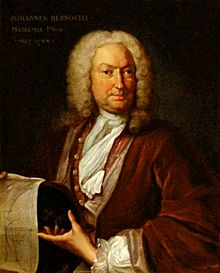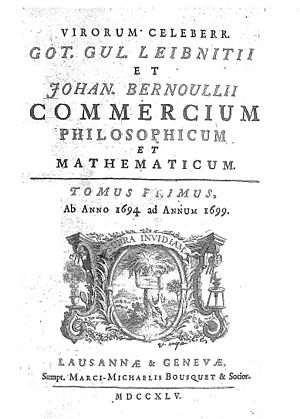Johann Bernoulli facts for kids
Quick facts for kids
Johann Bernoulli
|
|
|---|---|

Johann Bernoulli (portrait by Johann Rudolf Huber, circa 1740)
|
|
| Born | 6 August 1667 Basel, Switzerland
|
| Died | 1 January 1748 (aged 80) Basel, Switzerland
|
| Nationality | Swiss |
| Education | University of Basel (M.D., 1694) |
| Known for | Development of infinitesimal calculus Catenary solution Bernoulli's rule Bernoulli's identity Brachistochrone problem |
| Scientific career | |
| Fields | Mathematics |
| Institutions | University of Groningen University of Basel |
| Thesis | Dissertatio de effervescentia et fermentatione; Dissertatio Inauguralis Physico-Anatomica de Motu Musculorum (On the Mechanics of Effervescence and Fermentation and on the Mechanics of the Movement of the Muscles) (1694 (1690)) |
| Doctoral advisor | Nikolaus Eglinger |
| Other academic advisors | Jacob Bernoulli |
| Doctoral students | Daniel Bernoulli Leonhard Euler Johann Samuel König Pierre Louis Maupertuis |
| Other notable students | Guillaume de l'Hôpital |
| Notes | |
|
Brother of Jacob Bernoulli; the father of Daniel Bernoulli, Nicolaus II Bernoulli, and Johann II Bernoulli; and the uncle of Nicolaus I Bernoulli.
|
|
Johann Bernoulli (born August 6, 1667 – died January 1, 1748) was a Swiss mathematician. He was a very important member of the famous Bernoulli family, who were known for their work in mathematics and science. Johann is remembered for his big contributions to calculus, which is a branch of mathematics dealing with change. He also taught the famous mathematician Leonhard Euler when Euler was young.
Contents
Life of a Mathematician
Early Life and Studies
Johann Bernoulli was born in Basel, Switzerland. His father, Nicolaus Bernoulli, was an apothecary, which is like a pharmacist who prepares and sells medicines. His father wanted Johann to study business to take over the family spice trade. However, Johann was not interested in business. He convinced his father to let him study medicine instead.
While studying medicine at the University of Basel, Johann also started learning mathematics. He studied alongside his older brother, Jacob Bernoulli. The Bernoulli brothers spent a lot of time together. They focused on a new area of math called infinitesimal calculus. They were among the first mathematicians to truly understand and use calculus to solve many different problems. In 1690, Johann finished his medical degree. His paper was even reviewed by the famous mathematician Gottfried Wilhelm Leibniz.
Teaching and Debates
After finishing his studies, Johann Bernoulli began teaching differential equations. These are special equations that involve rates of change. In 1694, he married Dorothea Falkner. Soon after, he became a professor of mathematics at the University of Groningen in the Netherlands.
In 1705, Johann decided to move back to his hometown of Basel. On his way, he learned that his brother Jacob had passed away from tuberculosis. Johann had planned to become a professor of Greek at Basel University. Instead, he took over his brother's old job as the professor of mathematics.
Johann was a student of Gottfried Wilhelm Leibniz's ideas on calculus. So, in 1713, he supported Leibniz in a big debate. This debate was about who deserved credit for discovering calculus: Leibniz or Isaac Newton. Bernoulli showed that Leibniz's methods could solve problems that Newton had not been able to solve.
Bernoulli also supported René Descartes' "vortex theory" of how planets move. This theory suggested that invisible whirlpools in space pushed planets around. He preferred this idea over Newton's theory of gravity, which said that objects attract each other. Because of Bernoulli's influence, Newton's theory was accepted more slowly in Europe.

In 1724, Johann Bernoulli joined a competition held by the French Académie Royale des Sciences. The competition asked how a perfectly hard object would move another object when they hit each other. Bernoulli's ideas were based on Leibniz's earlier thoughts. He suggested that an infinite force would be needed to make a perfectly hard body elastic. Because of this, he was not awarded the main prize. However, his paper was later recognized in 1726 when the Académie looked at papers about elastic bodies. Bernoulli received an honorable mention in both competitions.
Images for kids
See also
 In Spanish: Johann Bernoulli para niños
In Spanish: Johann Bernoulli para niños
- Sophomore's dream – a pair of analytical identities by Bernoulli
- Partial fraction decomposition
 | Toni Morrison |
 | Barack Obama |
 | Martin Luther King Jr. |
 | Ralph Bunche |




